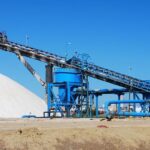Trump’s Steel and Aluminum Tariffs Double Down, Sending Shockwaves Through Canadian Industry
The steel beams that stretch across Vancouver’s skyline now carry an additional weight – that of heightened tariffs imposed by former President Donald Trump’s administration, now doubled and officially in effect. As of today, Canadian steel exporters face a crushing 25% tariff while aluminum producers must contend with a 10% levy when selling to their largest trading partner.
Walking through Vancouver’s bustling port yesterday, I witnessed firsthand the anxiety rippling through loading docks. Shipments ready for southern transport sat idle as logistics managers frantically recalculated costs and margins that had evaporated overnight.
“We’re essentially looking at a $250,000 hit on this shipment alone,” said Marcus Chen, operations director at Western Canadian Steel, gesturing toward a mountain of steel coils. “That’s not sustainable for any business operating on typical industry margins.”
The immediate market response has been severe. Industry analysts report Canadian steel stocks dropped an average of 7.3% when markets opened this morning, with aluminum producers facing similar downturns. The ripple effects extend far beyond raw materials producers, threatening an estimated 45,000 Canadian jobs directly tied to these sectors.
The decision comes as particularly painful given the integrated nature of North American supply chains. Canadian producers have long served as reliable suppliers to American manufacturers, with approximately 84% of our steel and aluminum exports heading to U.S. markets. The tariffs effectively disrupt decades of established trade relationships built under previous agreements.
Deputy Prime Minister Chrystia Freeland issued a forceful response yesterday, calling the tariffs “unjustified and completely unacceptable.” Government sources confirm that Canada is preparing reciprocal measures targeting American exports with equivalent economic impact – a strategy employed during previous trade disputes with the Trump administration.
The Business Council of Canada has already mobilized an emergency response team. “We’re looking at approximately $3.5 billion in direct export value under threat,” said Goldy Hyder, the Council’s president. “But the downstream effects on manufacturing, construction, and transportation sectors could easily triple that figure.”
What makes this round of tariffs particularly concerning is their timing amid global supply chain disruptions. Unlike previous trade tensions, today’s global manufacturing landscape offers fewer alternative markets and higher overall costs. According to industry publication Metal Bulletin, global steel prices have already increased 15% year-over-year before factoring in these new tariffs.
For small manufacturers like Calgary-based Precision Components, the impact is existential. “We’ve survived COVID, supply chain nightmares, and labor shortages,” said owner Justine Lapointe. “But this might be what finally breaks us. Our American competitors now have a 25% advantage in their material costs – how do we compete with that?”
While the federal government has promised support measures, industry leaders express skepticism about whether assistance can arrive quickly enough. Previous tariff compensation programs took months to implement while companies faced immediate cash flow challenges.
The situation carries profound implications beyond immediate economic damage. Trade experts suggest this represents a fundamental shift in continental economic relations that could outlast any single administration. “We’re witnessing the fracturing of North American economic integration that took decades to build,” noted Dr. Amrita Singh, international trade professor at UBC’s Sauder School of Business.
As Canadian negotiators prepare for emergency talks in Washington next week, the steel and aluminum that literally forms the backbone of our infrastructure has become the latest battleground in an increasingly uncertain trade landscape. For thousands of Canadian workers and hundreds of communities built around these industries, the future now hangs in precarious balance.
Will North American industrial cooperation survive this latest test, or are we witnessing the beginning of a permanent economic decoupling? The answer may determine not just the fate of our steel and aluminum sectors, but the very structure of Canada’s economic future.
For more coverage on this developing story, visit CO24 Business or CO24 Breaking News.

























